In 1994, HMS Tamar (Shore Base) was relocated to Stonecutters Island. Here are some photos of a visit made in 1996.
1910s Royal Naval Dockyard Entrance (today's Queensway)
Note the similar HMS Tamar insignia at the gate to the Royal Naval Base at Stonecutters.
HMS Tamar HQ
HMS Tamar Boat Basin (HMS Plover & HMS Starling)
HMS Tamar Ship's Bell
Battalion HQ
Battalion HQ Entrance
St Barbara's Church
Old Military Building (Officer's Mess)
Old Watch Tower (circa 1870) and High Wall.
Soldiers at attention in full uniform
RAF Wessex Helicopter Display (Low Hover Manoeuvre)
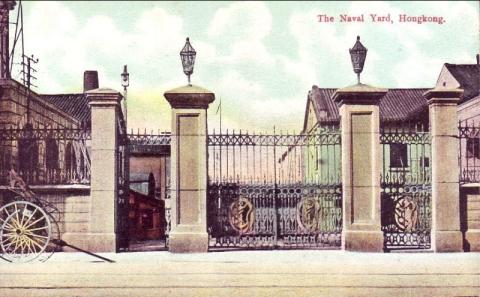
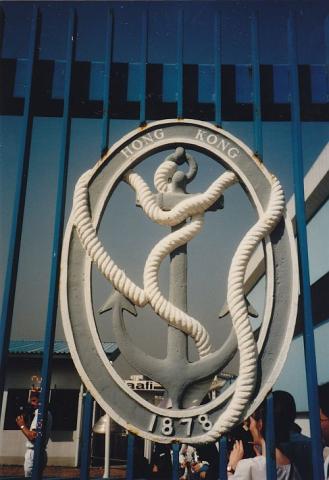
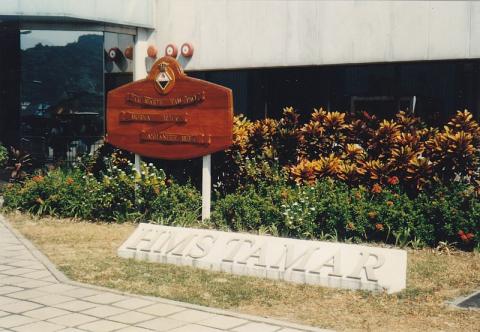
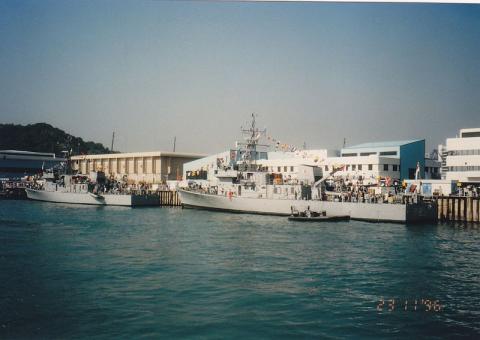
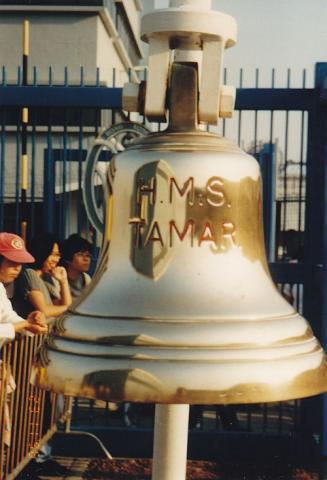
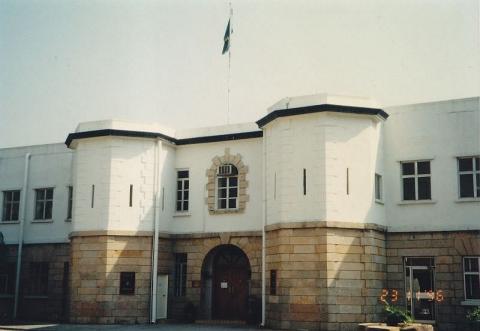
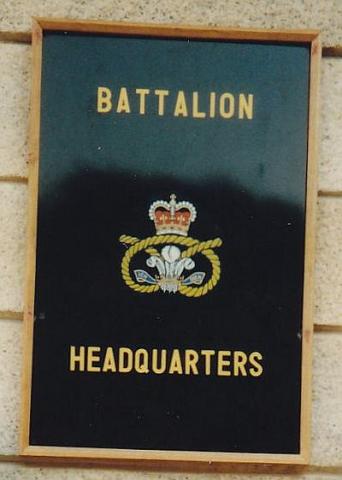
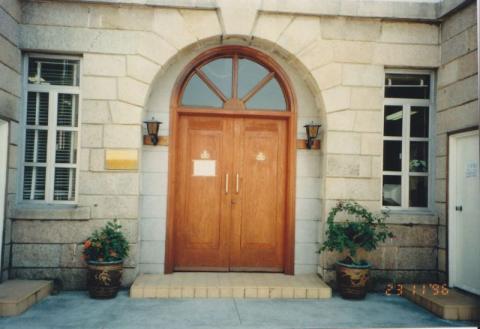
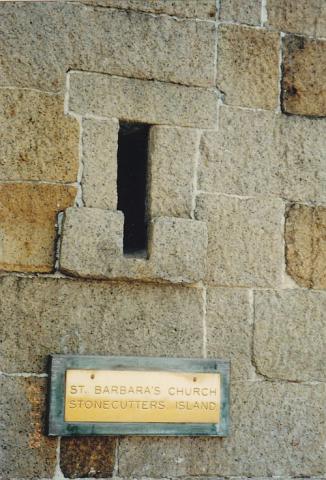
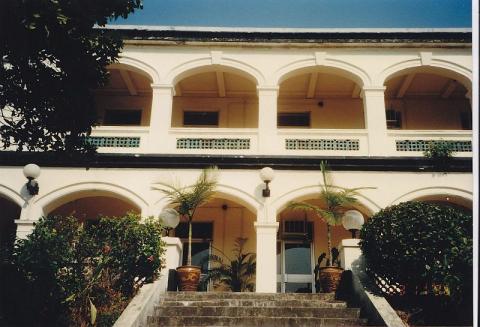
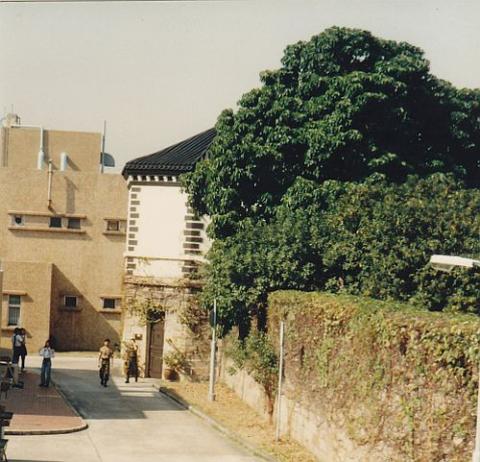
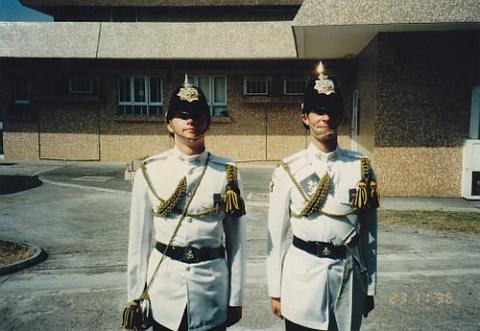
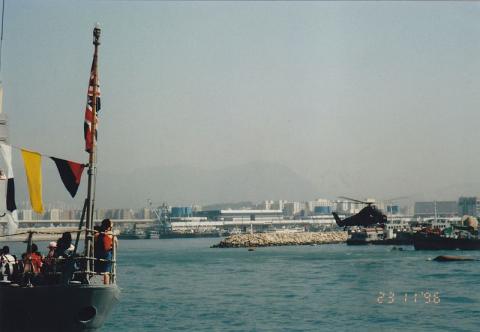
re: stonecutters
Great pics moddsey - only chance to see the island now - incidentally the government has proposed grade 1 and 2 ratings for a number of buildings on the island but they are all just described as Military Facilities, no photos.
Re: Stonecutters
Before the reclamations when Stonecutters was an island. Looking towards Kowloon and down at Stonecuttters from 1300 ft (400 m) up. Note the radio masts.
stonecutters
colin aitchison has over 400 photos of Stonecutters here: http://picasaweb.google.com/Colin.Aitchison7/TheRoyalNavyBritishArmyOnStonecuttersIslandHongKong#
The Tamar gate badge
I'm very interested in the date on the gate badge. This is wrongly stated (by Wikipedia, the RN Research Archive, the HKMCD and HKMM amongst others) to be the date the Tamar first came to Hong Kong (wrong by over a decade (full history in preparation - she visited HK at least 19 times in the course of her 33 years as a trooper)). It clearly isn't that and, indeed, it is almost certain that the badge has nothing whatever to do with HMS Tamar. What it will have had to do with is the Royal Naval Dockyard (as I've explained in another posting, RN Dockyards were mostly civilian run and only partly related to the RN's operational HQ in any given place). That said, what lies behind the date is obscure.
The authors of one of the government's many environmental impact assessments argue for 1878 being the year that the old Victualling Yard became the Naval Yard and the new buildings and boundary fence being constructed (http://www.epd.gov.hk/eia/register/report/eiareport/eia_1992011/HTML/Se…), which seems very probable. The likelihood is therefore that 1878 was the witching year in the transition from the old world of the Naval Stores to the new world of the (Royal) Naval Yard and the beginning of the campaign to set in stone the Royal Navy's initially tenuous hold on land in Central, that wasn't fully realized until the dockyard expansion in the first decade of the 20th century. If anyone has chapter and verse, it would be good to know.
Stephen D
1878
Hi Stephen,
There's an 1856 map in Mapping Hong Kong that shows the area named "New Naval Stores" (top left):
And an 1880 map in the same book that shows the same area marked "Naval Yard" (top centre):
So far so good. But I found a map in the UK National Archive collection (their ref WO 78/2362) with note "Corrections May 1873. May 75." that already shows the land marked "Naval Yard". So it looks as though the "Naval Yard" name was in use before 1878. Unfortunately nothing else springs to mind as a reason for them to use that year on their badge.
Regards, David
Naval Yard
Thanks David - clear enough - "Naval Yard" was indeed in use well early. For example in reference to the Naval Yard Police, first legislated for in 1875 with the ordinance being tidied up in 1878 (and again later...detail momentarily forgotten). The problem with the 'new buildings' solution is that we know from HMS Rifleman's amended fair chart of 1867 that the new buildings (that one can see in most photos just inside the main gate) were already in place by that year. So what it was that went on a decade plus after the new buildings had been fancied up, I'm not sure. There is another hydrographic clue in that by 1886 the shoreline of the old naval stores had shifted about 75m northwards and a new building with a tall chimney may have been erected. It might have been around this time too that the railings and gate were put in. So my hunch is that the '1878' has got something to do with a formal change of some sort signalled, maybe, by the creation of the fancy new main entrance gate and surrounding walls. Heaven knows where one might stumble on the hard evidence!
Stephen
1878
Maybe 1878 was merely the year in which the gates were constructed - just as houses bear the date of construction in the UK? Sorry to have to miss your talk this evening Stephen...
Nigel
Re: 1878 and Gates
China Mail 11 July 1878
New buildings were completed in the Naval Yard in 1878. There is also mention on 9 May 1878 that the old wall at the eastern end of the Naval Yard being demolished and replaced with a granite wall with iron pallisades matching the centre gates. Like the previous correspondent - the year when the 'new' gates were put in place.
1878
Thanks both. It is pretty much what I had supposed but lacked the evidence to go firm on. Somewhere (probably the National Archives in Kew) there will probably be chapter and verse with a receipt for the ironwork and a mention of some sort of ceremony to mark the new opening. At least it does confirm that 1878 and the good ship Tamar have nothing to do with each other bar inevitable synchony and the fact that Tamar was in town on a trooping run on 10th Feb (her ninth visit!)
Naval administration has its excellent scholars, but it is nonetheless a pretty untrawled field lacking 'glam' as inevitably it does. I'm still trying to find more than ballpark-hunch-and-coincidence-at-a-general-level explanations for the decision to build the 1860s troopships (Tamar and Orontes and a short time later the 5 Euphrates class (they're easier since the Indian Govt paid for them and there's more of a paper trail)) as RN vessels. It will have had something to do with the Directorate of Transports being removed from the purview of the Controller of Victualling and made exclusively an Admiralty bailiwick in 1862, beyond that it's heigh-ho and back to the trudge through primary sources.
StephenD
1878
Thanks Nigel. A variant on the talk is being given on Oct 28th under the aegis of the Royal Asiatic Soc HK.
StephenD